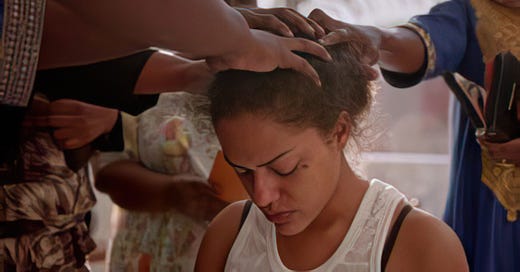Tumaini (Bertha Robert) lives in poverty. She wakes up early, the music of her rest abruptly cut off, and she gets to work. She delivers eggs, she cleans, and she restocks the store in which she works and owns. She attempts to collect debts, she watches as people wander in and look around, and leave without buying anything.
Angel (Magdalena Munisi) lives in relative luxury. She has just moved in with her boyfriend, is planning a move to Dubai, and works in a bridal salon, where champagne is poured for customers. She gets ready for a special evening out with make-up, beautiful jewelry, and a luxurious dress.
Stella (Helen Hartmann) works hard at her white-collar job and is attempting to have a child with her husband. Their upper-middle-class life feels incomplete. Her husband puts a hand on her shoulder as she loses her cool on a phone call and reminds her that she needs to try and keep her stress levels down, for the sake of their family. (This episode of the film hit me hard.)
Rose (Godliver Gordian) is married with young children and lives a middle-class life in a decent home, not different from well-appointed houses you’d find in the American midwest. She is attempting to balance her work with parenting when she and her husband receive less than welcome news.
Binti (2021) translates directly from Swahili into “daughter”, and can also mean “young woman.” The film tells the story of the aforementioned four young women as they navigate their lives in Tanzania, more specifically in the coastal city of Dar es Salaam. What the film lacks in polish (occasional sound issues, a few underbaked performances) it makes up for in ambitious storytelling. I love episodic stories that are laid out like this, and can’t remember the last time I was this interested to see how the lives of characters on completely different journeys might intersect. (I have a feeling it was Robert Altman’s Short Cuts, which I haven’t seen since 2005.) A fair warning, the hardships depicted herein can be difficult to watch; there are depictions of domestic abuse against women, verbal abuse, and patriarchal power structures that can make for an exhausting watch if you’re not in the right mindset for it. What I find myself wondering the most upon completion of the film, is what do Tanzanians think of it? Cursory internet research (the only kind I know) turns up some insight: one review that I enjoyed pointed out that the houses don’t look lived in. Unfortunately, once this is called out it’s hard to unsee. Fortunately, as a viewer looking to glean something from world cinema, I’m not too troubled by little mistakes like this. Especially when considering how early the director is in her career.
Speaking of the director, Seko Shamte, born in 1980, has worked in media for most of her life. Binti is her third feature-length film and her second narrative feature-length film. I was excited to find her work so accessible (via Netflix) as the many hours of research I’ve spent looking for African films to watch didn’t heed many directors who are women. (To be fair, searching on any continent doesn’t heed many women directors.) Google’s algorithm doesn’t seem to recognize Shamte yet…

Tonally, Binti swerves from stylized melodrama to transcendentalism to full-blown, out-and-out soap opera. While this can feel ham-fisted at times, as if individual scenes are “tails wagging the dog”, for the cinematically curious, it hardly gets in the way of the fact that this film is made by a Tanzanian woman and is tackling serious issues facing Tanzanian women in earnest.
From my read of the “discourse”, there is general fatigue with films that seem to reach for dramatic effect via the “low-hanging fruit” of trauma and abuse. There are many fair critiques of this nature, but I’d recommend considering how they may and may not apply to a film from Tanzania, a country that is likely in a different place than the US in terms of its understanding and relationship to these issues. At its best, a film such as Binti can create an appreciation for our shared humanity, and sadness for our shared faults. It was a satisfying watch. Despite the infrequent faults, I found with the film, the reward of researching my assumptions and takeaways helped me understand Tanzania better. It was well worth it.
Binti
Written by Maria Shoo, Seko Shamte, and Angele Ruhinda; Directed by Seko Shamte
2021
99 Minutes
Swahili, English
Stray Thoughts from the Editor
One week left in Movie Night’s August Trip to Africa! So far we’ve visited Ghana, Egypt, Senegal, and Tanzania. Where will we travel next week? If you guessed South Africa for a re-watch of District 9, you’re wrong!



